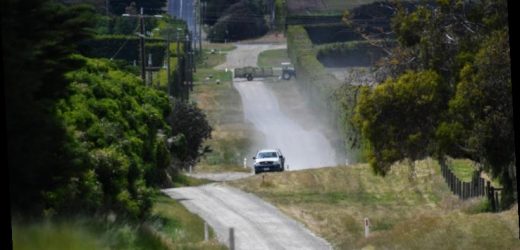Drivers could be forced to slow down on some degraded country roads and cars, trucks and motorbikes could be permitted to travel at different speeds under wide-ranging reforms designed to save lives on the road.
New rules proposed by a parliamentary inquiry into road deaths also include increased drug testing and more research into driver impairment from drugs.
Drivers are allowed to travel at 100 km/h on many unsealed roads in regional Victoria. Credit:Joe Armao
The cross-party committee calls for research on road rules in place overseas, including “vehicle-specific” speed limits for cars, trucks and motorcycles.
The Victorian government has confirmed it’s considering the report, having set a goal of halving road deaths by 2030.
In 2019, a total of 266 people died on Victoria’s roads, compared to 211 last year. The five-year average to 2019 remained stubbornly high at 256.
The report from the Inquiry into the Increase in Victoria’s Road Toll comes as authorities prepare for the Easter break, which is traditionally a busy time on Victoria’s roads. The committee included Labor, Liberal and crossbench MPs.
Some councils have already moved to enact speed limit change. The Mornington Peninsula Shire has introduced a two-year trial to slash limits on dozens of roads after declaring a crisis at the end of 2019, when 14 people died in local road accidents.
Labor MP and committee chair Enver Erdogan said the government’s “towards zero” policy had set an ambitious target to reduce the road toll to fewer than 200 lives and a 15 per cent reduction in serious injuries between 2016 and 2020.
“Unfortunately, the target was not met and in fact the road toll has plateaued in recent years,” he said. “There is no one reason for this, equally there is no silver bullet to fix the problem. Rather it is a matter of more hard work over a wide array of policy areas.”
Mr Erdogan said high-traffic country roads should be priorities for upgrades if their condition was poor so their current speed limits could be retained.
But the committee said relying on upgrades for unsafe low-traffic roads was not feasible.
“Default speed limits on such roads should be lowered to safer levels,” the report said.
The committee found there was a strong link between fatalities and remoteness on high-speed rural roads. It said the default maximum speed was particularly noteworthy on unsigned country roads because it was the same (usually 100 km/h) regardless of whether the surface was sealed or not.
“The committee recommends that the Victorian government review speed limits on all rural and regional roads as a matter of priority,” the report said.
On enforcement of driver impairment, current drug-detection methods look for traces of some drugs – but not all – in blood, urine, breath or saliva. But there is no test for the level of impairment.
“The committee recommends research into drug testing that identifies impairment in drivers and expansion of the drug-testing regime to include testing for cocaine.”
A state government spokeswoman said Victoria had pioneered many road-safety reforms, including mandatory wearing of seatbelts, random breath testing, compulsory bicycle helmets and roadside drug-driving tests.
“We’re always working hard to prevent the heartbreak of a loved one not making it home but tragically, road trauma continues to take a devastating toll on hundreds of families each year,” she said.
The state government will formally respond to the report later this year.
Most Viewed in National
From our partners
Source: Read Full Article



